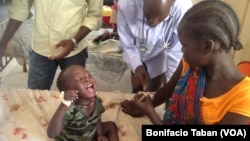BENTIU, SOUTH SUDAN —
The pediatric ward at the main hospital in Bentiu is overcrowded and under-staffed as an unusually high number of children suffering from Kala Azar and malaria have been brought in for treatment.
Malaria is the largest killer of children in the world, claiming the life of one child every 30 seconds and around 3,000 kids a day, most of them in Sub-Saharan Africa, according to the United Nations' Children's Fund (UNICEF).
Kala Azar, also known as visceral leishmaniasis, can be "100 percent fatal within two years" if left untreated, according to the World Health Organization (WHO).
Nyayub Kuol rushed her two-year-old son to the hospital in the capital of Unity state for treatment for malaria two days ago.
"My son was very sick... he could not talk, he could not eat. Sometimes he had difficulty breathing, and he had a very high fever. But since I brought him here, his condition has improved,” Kuol said.
Manila Denis’s 18-month-old daughter was admitted to Bentiu hospital six days ago, with Kala Azar, also known as leishmaniasis -- a disease carried by flies that live in the bush. Treatment for the disease usually takes around three weeks.
“When I brought my child here, she could not eat or drink milk. I have seen some improvement, and I hope her condition will continue to improve,” Denis said.
Malaria and visceral leishmaniasis usually hit during the rainy season, which is due to start in May.
Last year, around 100 people were treated at Bentiu Hospital for visceral leishmaniasis. Ten of them died of the parasitic illness, the symptoms of which include fever that can last for months in adults; and an enlarged liver, spleen and lymph nodes.
So far this year, 50 children with Kala Azar have been admitted to the hospital in Bentiu. There have not been any fatalities from the illness.
Malaria is the largest killer of children in the world, claiming the life of one child every 30 seconds and around 3,000 kids a day, most of them in Sub-Saharan Africa, according to the United Nations' Children's Fund (UNICEF).
Malaria kills one child every 30 seconds...Kala Azar can be 100 percent fatal within two years if left untreated.UNICEF and WH
Kala Azar, also known as visceral leishmaniasis, can be "100 percent fatal within two years" if left untreated, according to the World Health Organization (WHO).
Nyayub Kuol rushed her two-year-old son to the hospital in the capital of Unity state for treatment for malaria two days ago.
"My son was very sick... he could not talk, he could not eat. Sometimes he had difficulty breathing, and he had a very high fever. But since I brought him here, his condition has improved,” Kuol said.
Manila Denis’s 18-month-old daughter was admitted to Bentiu hospital six days ago, with Kala Azar, also known as leishmaniasis -- a disease carried by flies that live in the bush. Treatment for the disease usually takes around three weeks.
“When I brought my child here, she could not eat or drink milk. I have seen some improvement, and I hope her condition will continue to improve,” Denis said.
Malaria and visceral leishmaniasis usually hit during the rainy season, which is due to start in May.
Last year, around 100 people were treated at Bentiu Hospital for visceral leishmaniasis. Ten of them died of the parasitic illness, the symptoms of which include fever that can last for months in adults; and an enlarged liver, spleen and lymph nodes.
So far this year, 50 children with Kala Azar have been admitted to the hospital in Bentiu. There have not been any fatalities from the illness.





